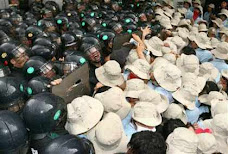
111 Nations Agree to Landmark Ban on Cluster Bombs
In a major victory, more than 110 nations agreed on May 28 in Dublin to a strong international treaty banning cluster munitions. In February 2007, Human Rights Watch helped launch a global campaign to prohibit the use of cluster bombs. We coordinated international treaty negotiation efforts and defeated attempts to weaken the treaty text. Human Rights Watch also successfully countered US efforts to pressure its allies to undermine the ban. As a result, in a decisive policy shift, Britain and other NATO allies endorsed the cluster ban treaty. Cluster munitions contain "bomblets" that are scattered from planes or by artillery shells and detonate like landmines. Thousands of unsuspecting civilians, many of them children, are killed or maimed by dormant cluster bombs each year. Like the ban against landmines, the cluster munitions ban represents a momentous advancement in the protection of people affected by conflict. Learn more.
Fewer Conflicts Involve Child Soldiers
The number of conflicts in which children are used as soldiers has dropped sharply over the past four years, according to the Coalition to Stop the Use of Child Soldiers’ 2008 Child Soldiers Global Report. Human Rights Watch is a leading member of the coalition, which surveyed military recruitment, policy, and practice in more than 190 countries. The report found that the number of conflicts using child soldiers has declined from 24 to 17 since 2004. Tens of thousands of children have been released from armed groups, as long-running conflicts in sub-Saharan Africa and elsewhere have ended. High-profile prosecutions by the International Criminal Court also seem to have contributed to enhanced public consciousness of child soldier recruitment as a crime. Despite these signs of progress, Human Rights Watch continues to document the use of children in conflict and to advocate that the children who are demobilized should get the rehabilitation they desperately need.Read more.
European Parliament, Belgian Senate, and Liberal International Party Endorse Yogyakarta Principles
In a recent victory for the rights of lesbian, gay, bisexual, and transgender (LGBT) people, Human Rights Watch successfully pushed for the endorsement and use of the Yogyakarta Principles by the European Parliament, Belgian Senate, and Liberal International Party. Human Rights Watch wrote targeted resolutions on the rights of LGBT people for these political bodies. The Yogyakarta Principles were adopted by a meeting of international law experts in Yogyakarta, Indonesia, in November 2006 in response to well-documented patterns of abuse against millions of people based on their sexual orientation or gender identity. The Principles set forth legal standards and recommendations for how governments and UN agencies can end widespread violence, abuse, and discrimination against LGBT people worldwide. Read more.
IN THE NEWS - Op-Eds by Staff HRW
After Guantánamo: The Case Against Preventive Detention Writing in Foreign Affairs, Kenneth Roth, executive director for Human Rights Watch, argues that terrorism suspects should be tried in the US justice system rather than languish in preventive detention.
Assessing the Human Cost of Air Strikes in Iraq In an interview with National Public Radio, Marc Garlasco, a senior military analyst for Human Rights Watch and former chief of high-value targeting for the Pentagon in 2003 during the Iraq war, reviews the loss of civilian life due to air strikes in Iraq and argues for greater restraint in how air strikes are used.
China Must Expand Press Freedom in Lead-up to 2008 Olympic Games Speaking to the Carnegie Council as part of an expert panel on China and human rights, Minky Worden, media director for Human Rights Watch, discusses the need to extend the temporary press freedoms given to Western journalists beyond the Games and to grant Chinese journalists the same freedoms as their international colleagues.
Get Involved with them
Become a Member of HRW or Make a Contribution
Human Rights Watch does not accept financial support from any government or government agency. Every investigation we undertake, every advocacy campaign we embark on, and every report we produce is funded solely by generous private contributions.































No hay comentarios:
Publicar un comentario